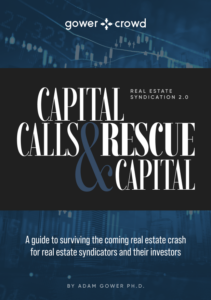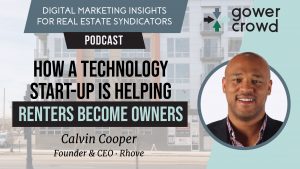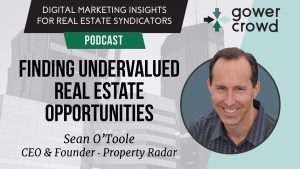Adam Gower: Today's episode at the National Real Estate Forum is extremely unusual in that it's actually a podcast of a podcast. I was invited to be the guest on Mapable USA with Ron Costa, and that is today's podcast. Enjoy.
Adam Gower: Welcome to the NationalRealEstateForum.org Podcast, Episode 242. Hey, thanks for joining me today. I'm Dr. Adam Gower, and this is the National Real Estate Forum, where I speak to leaders of the crowdfund real estate syndication industry so that you can learn about trends and practices in real estate investing, and how to raise capital online.
Adam Gower: Today's is a little bit kind of bass-ackwards, because I'm the subject of the podcast, today, rather than the host. I was actually contacted by Ron Costa, via LinkedIn, who connected with me, and asked me if I would be on his podcast called Mapable USA. I agreed to, and where I work, we have kind of a sound booth. It's like a telephone box that is completely soundproof. I set myself up in there with my mic, and I spoke to Ron.
Adam Gower: I have to tell you, it's funny being on the other side of the microphone; on the other side of the questions. It's not as easy as I have come to believe it must be, having spoken to so many people. Anyway, this podcast is me, on Ron's show. I hope you enjoy it. I'm not sure quite how, otherwise, to introduce it.
Adam Gower: He wanted me to talk about Opportunity Zones, so we do touch upon that, and it did inspire me to write an article ... To do some research, and to write an article. I know there has been a massive amount written about Opportunity Zones. I have one that should be ready fairly soon, so keep an eye out for that.
Adam Gower: You can find that at the show notes page for today's episode at the NationalRealEstateForum.org website. Just hit the Show Notes link in the top right, and search for Episode 242. All right, without further ado, here is Ron Costa introducing yours truly in his podcast, Mapable USA.
Ron Costa: Hello, everyone, and welcome to the Mapable USA Podcast, where we put you on the map. This is Ron Costa, broadcasting live from Las Vegas, in the Mapable USA Studios.
Ron Costa: Folks, we're always talking about crowdfunding. We're going to talk about bringing people into it, and putting them on the map. Then, today, we're going to talk about something that's really near and dear to my heart, and really doesn't get a whole lot of podcast talk, in my opinion; it's called real estate syndication.
Ron Costa: I am amazed at the number of people here that I know, in Las Vegas, that are into real estate - real estate agents, brokers - and they really don't have a clue as to what real estate syndication is. It's kind of a way of crowdfunding. You're talking about investing in real estate projects.
Ron Costa: Today, I brought on ... This guy's great. He's a real industry leader in the real estate syndication market. Let's all welcome here Adam Gower, from the National Real Estate Forum. Adam, how you doing today?
Adam Gower: I'm doing extremely well, Ron. Thank you very much, indeed, for having me on your show.
Ron Costa: Great. I appreciate the time that you're taking to be on this thing. I did a little intro, before, about real estate syndication, and how important it is. You've been involved in real estate for quite a long time, is that it? Tell me, what is your background, and how you got into this, in the first place?
Adam Gower: Yes, sure. I've actually been involved in real estate since the dawn of time. I try not to ... I don't confess to actually how long I've been involved; it gives away my age, but it's certainly more than 30 or so years.
Adam Gower: Actually, I started by pulling wires for an electrician. That's how I started in real estate, and ended up doing some syndications for multifamily apartments in San Diego. Then, I moved to Japan ,of all things-
Ron Costa: Wow, okay.
Adam Gower: -where I ended up building out the real estate portfolio for Universal Studios in Asia Pacific. I did that for a few years. Then I came back here, and I started developing my own portfolios.
Adam Gower: Then I kinda got lucky, Ron, because in 2007, as you know, the entire financial system almost came to a grinding halt. I got lucky because there was something in the air that was bothering me, and I sold my entire portfolio [cross talk]
Adam Gower: I went into the downturn with a lot of dry powder, and was intrigued by what was going on. I was brought in by a major West Coast bank to assist them with their divestment. I sold, or worked on around a billion dollars of distressed real estate deals during that time.
Adam Gower: Then, I went over to Colony Capital, who you may know. They're a major private equity fund. They'd bought around a billion dollars, sorry $7 billion or so from the FDIC, so I worked with them. Then, the worst thing in the world happened, and the economy picked up, so all this amazing opportunity went away.
Adam Gower: I decided to start to look at how tech was impacting real estate, and that's how I discovered what is called crowdfunding, but actually is more accurately termed syndication - actually, real estate syndication. As that's something that I have been doing throughout my career - raising capital for deals - the opportunities that, as you well know, the Jobs Act opened up for real estate syndication became really incredible; the opportunity to raise money [cross talk]
Ron Costa: Oh absolutely,
Adam Gower: -capital online. That's really what changed everything.
Ron Costa: From non-accredited investors, as well, which opens up a whole door for a lot of people.
Adam Gower: Yes, exactly. Non-accredited, and accredited investors, depending on what you do, right? We've talked, you and I, before about Regulation A, but there's Reg CF, and various other channels that non-accredited investors can use, as well. That's exactly right.
Ron Costa: When you're talking about syndication on a really top level, it's just a bunch of investors, or people pooling their money together to buy a real estate asset, is that right? That's the simplest definition of it, right?
Adam Gower: Absolutely, that's right. It's a group of people that come together to pool their resources, and buy, or invest in real estate. That's exactly right.
Ron Costa: All right, and now, this real estate investment is usually in the term of a commercial project, or projects - people who want to maybe develop a warehouse, or an apartment building, or something like that. We're not really talking about single-family homes, or things like that, but it's more on a high-level commercial, or is it? There's probably opportunities out there for everything, right?
Adam Gower: Syndication is used when you don't have enough money to do it yourself, basically, at the simplest level. If you have enough money to do a deal yourself, then you're probably better off doing it yourself, unless you want to expand into bigger projects, or more projects; in which case, you would need to access capital from other people. As soon as you do that , you're syndicating. If you ask friends and relatives for capital to invest in a deal, then you just became a syndicator.
Ron Costa: Right. Syndicators are also called sponsors, is that ...? Do you function as a sponsor? Is that your primary role?
Adam Gower: I would make the distinction between a sponsor, and a syndicator. Syndication is really related directly to the finance, to the capitalization of a deal. A sponsor is somebody who is the active manager of a project - the person who is managing the day-to-day developments of a project, or redevelopment of a project. A sponsor might hire a syndicator to raise the money for them.
Ron Costa: Got it. Right.
Adam Gower: There is a distinction. In most cases, the sponsor is syndicating their own deals, but these are two different roles, and people specialize in syndicating, but they don't actually manage the deals themselves.
Ron Costa: That's an interesting point, because I always thought of those two terms as interchangeable, but there's a big difference between those two, for sure. Who is the one that actually identifies the property? Is that the sponsor?
Adam Gower: Yes. The sponsor is the person who identifies the property, who comes up with the business plan, if you like, for the property. Is this property ... Am I going to redevelop it? Am I going to tear it down , and rebuild it? Am I just going to increase the rent? Whatever the business plan is, that's going to be ...
Adam Gower: Then, who actually engages in executing on the business plan, that's the sponsor. That's the person who is signing on the debt; the person who's the most liable for the deal. Yes, that's the sponsor, or the operator, or the developer is another interchangeable term.
Adam Gower: The syndicator is somebody who is going to be raising the capital, especially the equity capital, for that sponsor. Now, it might be the sponsor who raises the money for their own deal, in which case, like I said, they are syndicating their own deal, but they could go to a third-party syndicator, who will that money for them.
Adam Gower: Be sure to find out about my new book, "Leaders of the Crowd." You can find it at leadersofthecrowd.com, recently published by Palgrave Macmillan. You can buy it there, at leadersofthecrowd.com, and there is also an audio version. It's actually a series of conversations that I had with folk who were the visionaries that made the Jobs Act happen. Go ahead, check that out: leadersofthecrowd.com.
Ron Costa: Okay, great. Got it, got it. Now, years ago I guess syndication was a tough job, because you pretty much had to have a nice little Rolodex, and you had to do a lot of work. These days, there's a way to do it online, and that's something you guys specialize in, a lot, I believe, too. Isn't online syndication like the next new thing?
Adam Gower: Well, you know, it's interesting you ask that, and Ron, if you'll forgive me, I'm actually going to plug my new book. Your timing is perfect, actually, for this podcast [cross talk]
Ron Costa: Absolutely. Plug away.
Adam Gower: Seriously, I got an email [cross talk].
Ron Costa: This is what the Mapable USA Podcast is all about. Go on.
Adam Gower: Hey, listen, it's top of mind, because I actually got an email from my publisher, Palgrave Macmillan, this morning, confirming that my new book, "Leaders of the Crowd" - and you can find out more about that at leadersofthecrowd.com - just was published this morning. I guess it's digital, but it'll be out in hardcover in a couple of weeks.
Adam Gower: The reason I mention it, apart from the obvious reason for wanting everybody in the world to buy it, and see it on the New York best-seller list, is that it actually answers your question. Your question was: is online syndication, or mass syndication, if you like, something new?
Adam Gower: Interestingly, it's not something new. I'm going to get a little kind of technical with you, if you don't mind, right now, but in 1933, Congress passed the Securities Act. The Securities Act of 1933 actually prohibited crowdfunding - what is called crowdfunding.
Adam Gower: Everything until 1933, the entire infrastructure upon which was based, or was financed, was through crowdfunding. It was all syndications, huge syndications that were run by banks, and financiers to finance the growth of America.
Adam Gower: In 1933, after the Great Depression, it was prohibited; at least it was prohibited to do it in any public sphere. You couldn't publicly solicit, or what's called general solicitation. There was limitations put on it. The only way you could do that was by doing an IPO; going public. That involved huge expense - a lot of time, and a lot of money.
Adam Gower: In 2012, the Jobs Act rolled back those restrictions. What is new is not that you can now generally solicit; that existed before 1933. What is new is that, today, you can generally solicit. You can advertise, or promote your deal, but now you can do it online. You've never been able to do that before.
Adam Gower: That's the fundamental shift in how you syndicate a deal. If I may continue briefly, Ron, what happened between 1933 and 2012 was that sponsors ... The only way they could raise money for their deals, by law, was by going to somebody that they already knew. They had to have a pre-existing relationship, before they could solicit an investment from somebody.
Adam Gower: The 2012 act said, "You don't have to have that relationship anymore. Now, you can advertise." Suddenly, developers and sponsors, in order to raise capital for their deals, they don't have to go to the country club, or friends and family, or business associates anymore. Now, they have to learn how to advertise, and how to manage digital marketing, in order to attract investors online. That's the fundamental shift, and that's actually what's so exciting about this new world.
Ron Costa: Yeah, well, like everything else, everybody's in the marketing business; everybody has to get people's eyes on their projects, and crowdfunding, and online is a great way to do it.
Ron Costa: In fact, I was just looking at one of your websites believe it was, gowercrowd.com. You wrote a blog post about seven steps to raising equity online. It seems so easy [cross talk] everyone should be able to do this, but that's just not the case. It's hard; it's still hard. People think, "Oh, I'm gonna put my deal on a portal, and everybody's gonna come, and invest." You've still got to do a lot of work marketing, and I'm sure you've run into that a lot of times.
Adam Gower: Yes, that's right. There are seven key steps that you have to take, but it does take a lot of sophistication to do it. You do have to suddenly become a digital marketing expert, in order to be able to do it promptly. The biggest issue for sponsors, of course, is that having been prohibited from using technology to raise money for their deals means that there are very few sponsors, and developers who have any skill set in doing that, because it was-
Ron Costa: Absolutely.
Adam Gower: They never had to. Whereas, if you think of any other industry, they all advertise online - cars, watches, phones, food, whatever. Even the local grocery- sandwich shop was allowed to advertise online, so they became proficient at doing that, and using social media to gain visibility.
Adam Gower: Well, now, suddenly, sponsors have the opportunity to do that, and it is ... You do have to acquire new skills. That's basically what I do is I sit in between sponsors, and the investment community, by providing all the infrastructure that sponsors need in order to be able to go out there, and raise capital, so that they can stay focused on the business of real estate, and not suddenly become web developers, and social media experts.
Ron Costa: We've taken it from that sponsor level, right now ... I kinda get what they're supposed to do. Let's talk about from the investor level, now, from the person who wants to get involved in crowdfunding, and wants to invest in one of these syndicates, or these funds, or whatever you want to call them. How does the investor know that the syndicate is a good deal, or that this specific thing is a good deal? Is it just reputation? How do they know?
Adam Gower: That is the $64,000 question, isn't it? There you go, I'm dating myself [cross talk] a show, wasn't there, an American show that had the $64,000 question on it? You know what, Ron? It is staggeringly difficult to know.
Adam Gower: Look, I have been through, now, I don't know, three ... At least three major downturns in my career in real estate. The first time that I started investing in real estate was in the 1980s, so I was just in my 20s, early 20s. I, on paper, had made millions of dollars. I mean, really, literally, I thought everything that I touched was turning into gold. I had all these partnership interests in real estate deals.
Adam Gower: This is the key: as the market was going up, it seemed that I could do no wrong, and that no one [cross talk] just no way you could lose money in real estate. Then, guess what happened? The market turned, and I lost everything. Everything that I had. I really went from being a paper millionaire in my 20s to actually being in debt, because I'd borrowed against it, foolishly.
Adam Gower: I think that is ... The biggest issue today is that you have, since crowdfunding became lawful again, that the real estate market has only been on an upward trajectory. It's very easy to look at all the deals out there with these amazing returns, and imagine that it's just going to keep on going forever.
Ron Costa: Yes.
Adam Gower: I'm dancing around your question a little bit by, I guess, contextualizing how difficult it is. The only way, this sounds a bit glib, Ron, honestly, and I don't mean to sound this way. but the only way to really know if you're into a good deal is if that thing survives a downturn.
Adam Gower: There are some key things in my personal- the way that I invest, let's put it that way. I will only look at deals that have long-term horizons. I'm not comfortable with one to five years, for example. I don't like this kind of period, especially at this stage of the cycle. Chances are that you're going to run into trouble. There's almost no doubt at all that there will be a downturn.
Adam Gower: Secondly, it's leverage; it's the amounts of debt. If you see a deal that has excessive debt, or very heavy debt, that's going to be the killer, when there is a downturn, because it will be very difficult for a sponsor to cover that debt, and they'll lose it to the bank.
Adam Gower: The third thing is the experience of the sponsor, and how much have they got in the deal? How are your interests aligned with those of the sponsor? The sponsor's got no money in the deal, and are just taking fees out? Well, they're not motivated to look after your interests [cross talk]
Ron Costa: Yeah, in the long term; certainly not.
Adam Gower: Right? If they put 50 percent of the money in, then they stand to lose, as well. They're going to be more interested in making the right decisions.
Ron Costa: Right. Exactly. Exactly. Everyone's afraid of that B-word, right now. That whole bubble burst, or whatever you want to call it, right? Is there any area in particular that you like right now, in terms of geographic location? Any states, or California? I know you're based out in California, I believe.
Adam Gower: Yes. I am extremely conservative, and I really think that we are at the very, very tail end of the current cycle. I've made a couple of investments in the last year, but for the most part, I'm keeping my powder dry. In fact, I've been selling under-performing assets [cross talk] market, I think, is so high. Get into cash. Look, there are always going to be pockets where there's opportunity.
Ron Costa: You just hit the key word, right now, because I wanted to end with this topic. Right now, Opportunity Zones are a big topic, right now; the whole qualified Opportunity Zones. Are you familiar with them? Have you done any work with that, at this point, yet? They're basically just glorified syndications. They're basically real estate syndications, in the most part, I believe.
Adam Gower: Are you familiar with a 1031 exchange [cross talk] A 1031, for those who are not familiar, basically allows you to defer payments of tax until later. You invest in a deal, or you buy a deal, and you sell it, you're going to be [inaudible] You're liable for capital gains tax.
Adam Gower: If you do a 1031, you can switch ... You can move all the money. and all the profit out of one deal, and move it into another deal, and you defer the tax liability until later, until you actually [cross talk] and take cash out.
Adam Gower: The Opportunity Zone, kind of, in some ways, is similar in that it creates ... By investing in an Opportunity Zone, it creates the opportunity to mitigate your tax burden, at the end of the day; to eliminate tax liability, to exit, under certain conditions.
Adam Gower: They're not syndications, per se, but a of people who are investing in Opportunity Zones, in real estate in Opportunity Zones, are syndicating their deals. If you're interested in mitigating your tax liabilities from real estate investing, then what you can do is you can invest in an Opportunity Zone, and you can do that through crowdfunding.
Adam Gower: You can find any one of dozens of funds, or sponsors, who are investing in those Zones, or those sponsors are syndicating that deals in Opportunity Zones that you can invest in, to take advantage of these tax benefits that the government has handed out.
Ron Costa: Yeah, and Adam, we're taking the bull by the horns on this project. We've put up the QOZMarketplace.com as a source for that, which will list all the qualified Opportunity Zones, and the number of funds that we've located. We've located about maybe 50 or 60 of these funds that are specializing in this.
Ron Costa: The reason why I asked that question earlier was because everybody that's contacting us through the site, and there've been ... These people are looking at major capital gains. I would say 8 out of 10 of our inquiries right now, people are looking at placing about $800,000 to almost a $1 million worth of capital gains taxes into these funds. They ask me the same question: what is a good fund? Which of these good funds have good projects?
Ron Costa: It gets back to what you just said a couple minutes ago - it's really, really hard to answer that question. It's really, really tough. It's almost like, "Well, it's a good fund if it works in the long term." Well, how do I know that?
Adam Gower: You've hit the nail on the head, there, Ron, because it's one thing ... You've still got to have a good deal. The tax benefit is icing on the cake. If you don't have a good deal, or a good sponsor investing in Opportunity Zones, or anywhere, for that matter, you could still lose your shirt [cross talk]
Ron Costa: Exactly, yes.
Adam Gower: Finding the right deal, and the right sponsor, and the right fund is still a critical discipline. There's no good investing in a deal that loses money. You're not going to make money, so you're not going to benefit from the taxes.
Adam Gower: Your first question: how do you identify a good deal? That's the fundamental responsibility that you have to have over your own money, and then, you can benefit from the Opportunity Zones, and the tax benefits.
Ron Costa: Like you said, if anyone takes anything away from this podcast it's that you can get into real estate investing through crowdfunding, but you have to make sure that you're in the right fund, and you're in the right deal; you have the right sponsor; right property. It's not a slam dunk. There is risk involved, and people have to understand that.
Ron Costa: That's clear in just about every transaction, any kind of real estate deal. However, as you mentioned earlier, too, real estate's been going up so far, it's almost like it can't lose. It's like, "Okay, great, whatever project ..." You throw a dart at a dart board, and you invest in that land, and it's go up. Now, we're looking at something that may not be like that, the next couple years. Who knows? Who knows?
Adam Gower: Exactly. Hey, Ron, what is [cross talk]
Ron Costa: The website is QOZMarketplace.com; Q as in qualified; Opportunity Zone. QOZMarketplace.com. While we're pitching websites, Adam, tell everybody out there how to get a hold of you, or what websites you're at. Tell us about the National Real Estate Forum, and how we can get in touch with you.
Adam Gower: Sure. Hey, thanks so much for asking. I have a couple of key websites. One is the National Real Estate Forum, or NREForum.org, actually; O-R-G. That's my podcast website, where I talk to leaders of the real estate crowdfunding industry.
Adam Gower: Then, I have, I guess, an educational site that is GowerCrowd.com. At Gower Crowd, that's where I provide free resources for investors looking to raise capital. I'm sorry, for sponsors looking to raise capital, and also, educational resources for investors wanting to learn how to invest, actually, to answer your questions. How do I invest wisely? Those are my two websites.
Ron Costa: Great, great. It sounds like, Adam, that you don't get any sleep either. We do a lot of work [cross talk].
Adam Gower: Yeah, it's so exciting, Ron. It's just a staggeringly exciting world that we live in, and you know [cross talk]
Ron Costa: It is. There's a lot of opportunity. It's always fun. Yeah, go on ...
Adam Gower: Yes, and you know what? I'll tell you what, as we look into the near future, the next two to five years, the very sense that there will be a downturn is probably the most exciting - I hate to say it - but only because it will open up extraordinary investment opportunities again. That's why [cross talk] like you say, barely ever sleep.
Ron Costa: I love it. That sounds funny. All right, all right, listen ... Folks, you're listening to the Mapable USA Podcast, with myself, Ron Costa, and our guest today, Adam Gower, from the National Real Estate Forum. Adam, thank you so much for being a guest on the show. I really appreciate your time and insights. It was great. Really good stuff.
Adam Gower: My great pleasure, yeah. Really, really flattered that you asked me. Thanks so much, Ron.
Ron Costa: Everybody listening, go to MapableUSA.com; that's our website. If you scroll down, you'll see where we're syndicated. Go and click your item of choice, and subscribe, and listen to us. We love doing this. Thank you so much for listening, and we'll be at you next time with another Mapable USA Podcast. Thanks for listening, and have a great day, everyone.
Adam Gower: Well, there it is. That was my conversation with Ron Costa. It's a lot harder than I had thought to be on the other side of the interview. I'm very grateful to Ron for having invited me. He's a good guy.
Adam Gower: His website's very interesting. You should definitely take a look at that, if you are interested in QOZs - qualified Opportunity Zones. It's called QOZMarketplace.com. You'll find all of the links at the Show Notes page at the NationalRealEstateForum.org; just hit the Show Notes button, top right, and search for Episode 242.
Adam Gower: In the next podcast, I am actually going to be the host of my own podcast again, and I speak to a fellow called Peter Linneman. Peter is a professor, and has recently concluded some research that indicates that a 10-year hold for real estate is the optimal, actually, the optimal minimum hold period for any kind of real estate investing.
Adam Gower: It's very interesting. I actually ties very closely into my own investing philosophy. Long term is better than trying to get in and out quickly. Y may not have exactly the same high returns, but you certainly have more stability, and more predictability. right, the next podcast.
Adam Gower: Thanks for tuning in today, a thank you to Ron Costa for having asked me to be on your podcast. I really appreciate it. It was a lot of next episode, this is me, Dr. Adam Gower, signing off.
The above audio transcript of "242 Ron Costa, Mapable USA.mp3" was transcribed by the best audio transcription service called Sonix. If you have to convert audio to text in 2019, then you should try Sonix. Transcribing audio files is painful. Sonix makes it fast, easy, and affordable. I love using Sonix to transcribe my audio files.
















